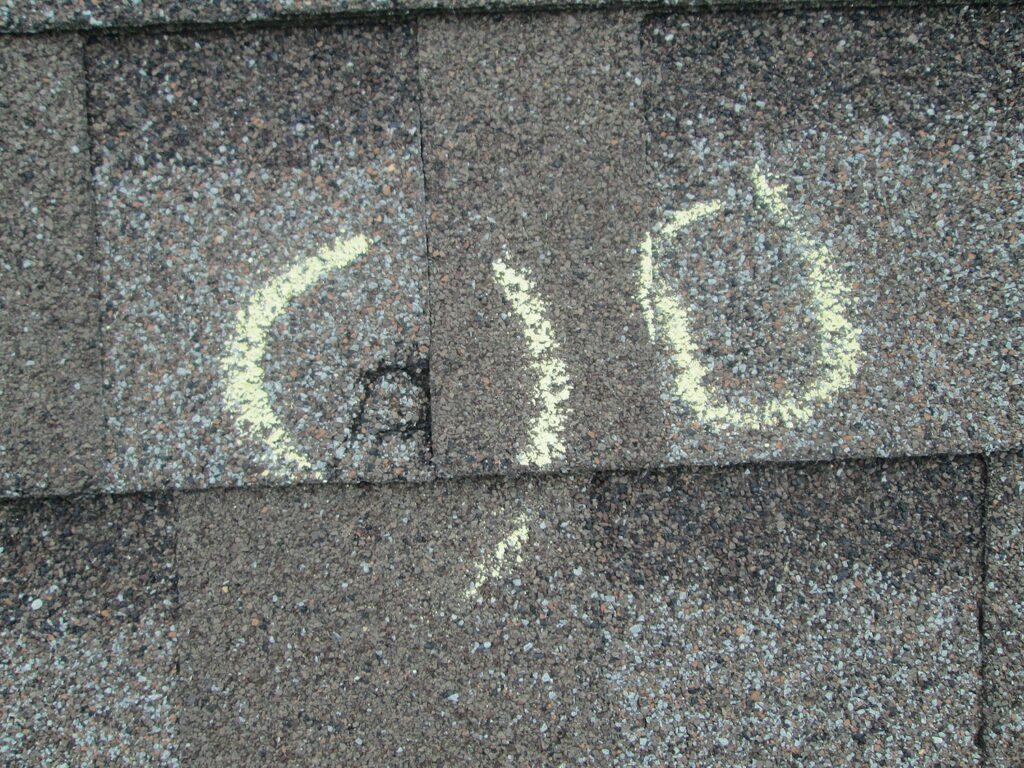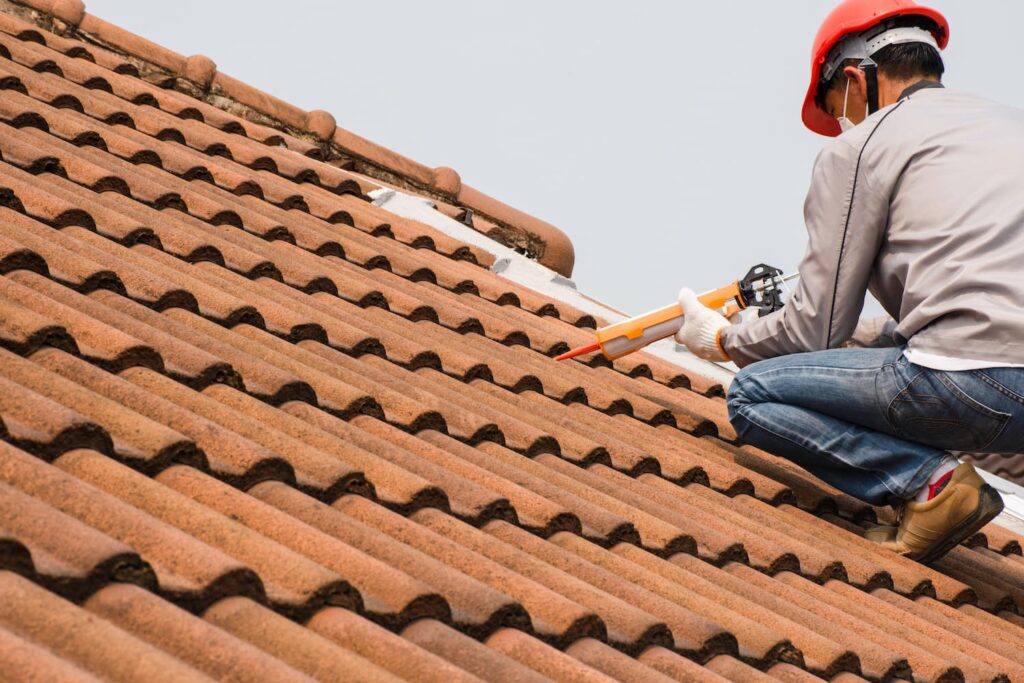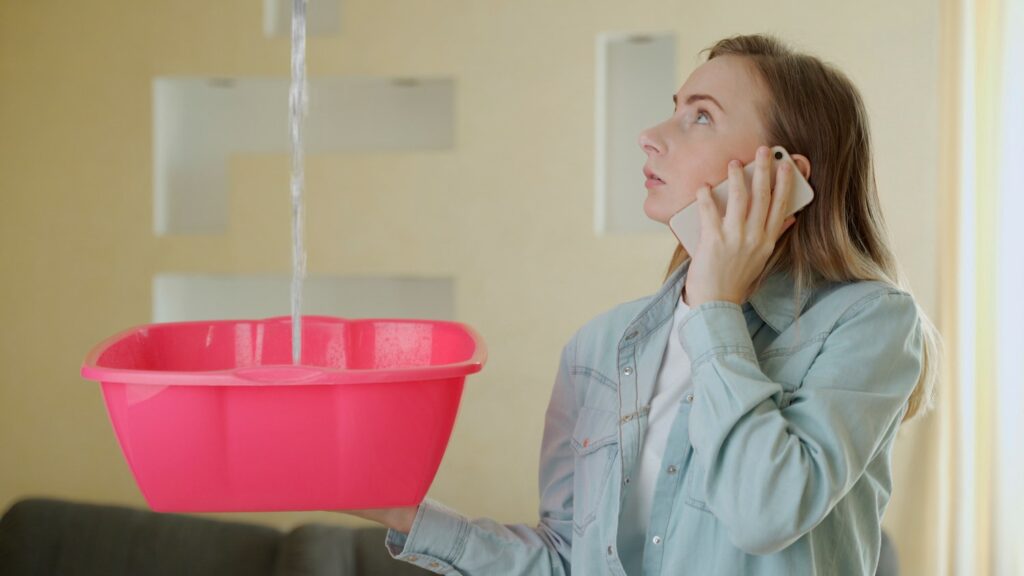Roof leaks can range in severity from minor inconveniences to major issues requiring full roof replacements. The average roof repair cost in 2024 is $1,200, but the range varies widely, from $150 to $10,000+. The total roof repair cost depends on factors like the extent of the damage, the materials used, and the accessibility of your roof.
This guide will help you understand the potential costs of roof leak repairs, the factors influencing these costs, and whether a repair or a full replacement is the best option for your home.
Common Causes of Roof Leaks
Environmental factors, physical damage, or the natural aging process of roofing materials typically cause roof leaks. Let’s explore the most common causes:
1. Hail Damage
Hail can cause significant roof damage, especially in areas prone to severe storms. Even smaller hailstones can dent shingles and cause tiny cracks, leading to leaks. These cracks can go unnoticed until water seeps through the damaged areas. Over time, repeated hail exposure weakens roofing materials, making them more susceptible to leaks during rainstorms.
2. Wind Damage
High winds are a major contributor to roof leaks. Wind can dislodge shingles, rip them off completely, or lift them just enough to let water seep in. The danger with wind damage is that it’s not always immediately visible. After a storm, shingles may lie back down flat, giving the appearance that your roof is intact, but underlying damage may have occurred, leading to leaks in the future.
3. Animal Infestation
Animals like squirrels, raccoons, and birds can cause significant damage to roofs. They can chew through roofing materials, create holes, and nest in attics. Once these access points are created, water can easily leak into your home. Infestation is a slow process, often undetected until damage has already occurred, making regular roof inspections essential.
4. Ice and Snow
In colder climates, ice dams are a common cause of roof leaks. When snow accumulates on the roof, it melts and refreezes at its edge, causing ice dams. These dams trap water, preventing it from properly draining off the roof. The water then finds its way underneath shingles, leading to leaks and structural damage. The weight of accumulated snow can also lead to roof collapse in extreme cases.
5. Aging Roof
As your roof ages, the materials naturally degrade. Asphalt shingles, for instance, lose their granules over time, leading to cracks and leaks. Older roofs are also more vulnerable to damage from weather and physical impacts. If your roof is nearing the end of its lifespan (typically 20-30 years for asphalt), leaks may become more frequent, and a full replacement may be a better option than repeated repairs.

Common Minor Roof Repairs
Minor roof repairs are the easiest to fix and often the least expensive. Homeowners with DIY skills can often tackle some of these repairs themselves. Here are a few of the most common minor roof repairs:
1. Replacing Missing Shingles
High winds or severe storms can blow shingles off your roof, exposing the underlayment. Replacing a few shingles is a quick fix that typically costs between $150 and $500, depending on the number of shingles that need replacement.
2. Patching Small Holes
Small holes in your roof can be caused by nails or falling debris. These are often easy to patch and cost around $100 to $300.
3. Clearing Gutters
Clogged gutters can cause water to back up and seep into your roof. Regularly clearing your gutters can prevent leaks and is a relatively inexpensive fix. Repairs cost around $200 to $500 if water damage has already occurred.
4. Re-insulating the Attic
Poor insulation can cause heat to escape, leading to ice dams and other issues. Re-insulating your attic can cost anywhere from $300 to $1,000, depending on the size of the area and the type of insulation used.
Major Roof Repairs
Major roof repairs are more involved and often require professional help. These repairs address significant damage that, if left unchecked, could lead to further deterioration or require a full roof replacement.
1. Flashing Replacement
Flashing is the material installed around roof features like chimneys, skylights, and vents to prevent water from seeping into the seams. Damaged flashing is one of the most common causes of roof leaks. Replacing flashing costs anywhere from $500 to $1,500, depending on the extent of the damage and the area needing repair.
2. Gutter Repair or Replacement
Gutters are essential for directing water away from your roof and home. Damaged gutters can cause water to pool on your roof, leading to leaks and water damage. Depending on your home’s material and size, replacing gutters can cost between $700 and $3,000.
3. Roof Decking and Underlayment Replacement
If water has seeped through the shingles and damaged the underlayment or decking, you may need to replace these layers. This type of repair can cost anywhere from $1,000 to $5,000, depending on the damage’s severity and the affected area’s size.
Roof Leak Repair Costs by Severity
Minor Repairs ($150 – $500)
These repairs typically involve fixing small holes, replacing individual shingles, or re-caulking an area to make it waterproof. These repairs are relatively quick and inexpensive and can often be done by the homeowner or with minimal professional help.
Moderate Repairs ($500 – $5,000)
Moderate repairs include replacing flashing, fixing gutters, or repairing underlayment. These repairs may involve multiple steps and more extensive labor, increasing labor costs.
Severe Repairs ($5,000 – $10,000+)
Severe repairs are often required after major storms or when leaks have been left untreated for a long period. These repairs may involve replacing large roof sections, including shingles, underlayment, and decking. In some cases, severe damage may require a full roof replacement.

Factors That Affect Roof Leak Repair Costs
Several factors can influence the cost of roof repairs. Understanding these factors can help you plan and budget for potential repairs:
1. Roof Size
The size of your roof plays a significant role in determining repair costs. Larger roofs require more materials and labor, which increases the overall cost.
2. Roof Slope or Pitch
Steeper roofs are more challenging to repair because they require extra safety precautions and are more labor-intensive. Due to the additional time and effort required, roofers may charge more for repairing a steep roof.
3. Extent of the Damage
The more extensive the damage, the higher the cost. A small leak might only require a minor patch, but a large leak could indicate more significant structural issues that require more extensive repairs.
4. Roof Accessibility
Roofs that are difficult to access due to height or surrounding obstacles like trees can be more expensive to repair. Roofers may need special equipment, such as scaffolding or lifts, to reach certain areas, which adds to the overall cost.
5. Roofing Material
The type of roofing material on your home also affects repair costs. Some materials, like asphalt shingles, are easier and cheaper to repair than others, such as metal or clay tiles. Here’s a breakdown of average repair costs by material:
| Material | Cost per Repair |
| Composite Shingles | $250 – $300 |
| Asphalt Shingles | $400 – $600 |
| Clay Tiles | $600+ |
| Metal Roofing | $700+ |
| Wood Shingles | $800+ |
Does Insurance Cover Roof Repairs?
In most cases, home insurance will cover roof repairs if the damage is caused by a weather event or accident, such as a storm, wind, hail, or falling debris. However, insurance does not typically cover damage due to neglect or age-related wear and tear.
Check your home insurance policy or contact your insurance provider to determine whether your roof repairs are covered. Remember that you may need to pay a deductible before insurance coverage kicks in.
When to Repair vs. Replace Your Roof
Knowing when to repair or replace your roof can save you time and money in the long run. Here are some situations where a full roof replacement may be more cost-effective than repairs:
- Age of the Roof: If your roof is over 20 years old and has frequent leaks or damage, a replacement may be a better long-term solution.
- Extent of the Damage: Widespread leaks, rotting wood, or structural damage are signs of insufficient repairs.
- High Repair Costs: If repair costs are approaching the price of a new roof, it may make more sense to invest in a replacement rather than continue patching up issues.
Preventative Maintenance Tips
Preventing roof leaks is the best way to avoid costly repairs. Here are a few tips for keeping your roof in top condition:
- Regular Inspections: Have your roof inspected by a professional at least once a year to catch any potential issues before they become major problems.
- Clean Gutters: Ensure your gutters are clear of debris to prevent water from backing onto your roof. Continuing with the expanded version to reach the 2,500-word goal:
- Trim Overhanging Trees: Branches that hang over your roof can damage shingles during storms and increase the likelihood of leaks. Regularly trimming these branches will help prevent damage.
- Proper Attic Ventilation: A well-ventilated attic helps regulate temperature and moisture levels, reducing the risk of ice dams and other issues that can lead to leaks.
- Address Issues Immediately: Don’t wait to repair minor leaks or damage. Addressing problems as soon as they arise can prevent more extensive (and expensive) repairs in the future.
- Roof Flashing Maintenance: Flashing around chimneys, vents, and skylights is one of the most common areas for leaks. Ensure that these areas are properly sealed and maintained to prevent water from getting through.
- Check for Signs of Wear: Even the best roofing materials will show signs of wear over time. Check for cracked, curled, or missing shingles and any visible leaks or stains on your ceiling.
Hiring a Professional Roof Repair Team
Hiring a qualified roofing contractor is important when it comes to roof repairs, especially significant ones. DIY repairs might save money upfront, but professional repairs ensure the job is done correctly and will last. Here are a few reasons why hiring a professional roofer is a smart choice:
- Expertise and Experience: Professional roofers have the knowledge and experience to diagnose roofing problems and provide long-term solutions accurately. They understand the intricacies of different roofing materials and can recommend the best approach for your situation.
- Safety: Roof repair, particularly on steep or high roofs, can be dangerous. Professional roofers are trained to work safely at heights and have the necessary equipment to prevent accidents.
- Quality Workmanship: A professional roofing contractor will use high-quality materials and tools to ensure your roof is properly repaired. This means fewer issues down the road and greater peace of mind for homeowners.
- Warranty Protection: Many roofing contractors offer warranties for their repairs. If something goes wrong after the repair, the roofer will return to fix the issue at no extra cost. DIY repairs generally don’t come with this level of protection.
Ask about their experience, licensing, insurance, and customer reviews when looking for a professional roofing contractor. Reputable roofers should also provide detailed estimates and clearly explain the scope of the work.
Average Lifespan of Different Roofing Materials
Understanding the expected lifespan of your roofing material can help you plan for future repairs or replacements. Here are the average lifespans for common roofing materials:
- Asphalt Shingles: 15-30 years
- Composite Shingles: 20-50 years
- Metal Roofing: 40-70 years
- Clay or Concrete Tiles: 50-100 years
- Slate Tiles: 75-200 years
- Cedar Shakes: 30-40 years
The actual lifespan of your roof will depend on factors such as climate, proper maintenance, and the quality of the installation. High-end materials like slate and metal offer long-lasting durability but come with higher upfront costs. Asphalt shingles, while more affordable, generally need to be replaced sooner.
Get a Free Estimate from a Roofing Expert
When dealing with roof leaks, acting quickly to prevent further damage to your home is essential. Whether you need a minor repair or a full roof replacement, the team at Apple Roofing can help. We offer comprehensive roof inspection services to assess the damage and provide an accurate estimate for the repair or replacement costs.
Contact Apple Roofing today to schedule your free estimate and protect your home from leaks and water damage.

